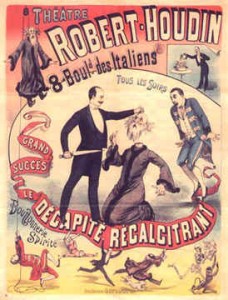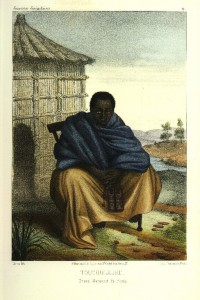Magicians used to take the name of a famous predecessor, bastardize it slightly, and pay homage to their forebearer while placing themselves in a continuum. Harry Houdini, born Ehrich Weiss, took his name from the famed French magus Jean Eugène Robert-Houdin. At one point, the Frenchman was supposedly assigned by his government the odd task of traveling to Algeria and using his hocus-pocus to influence so-called Arab tribes away from the guidance of Islamic leaders (or “marabouts,” as they are referred to in the piece.) An excerpt about this deeply ethnocentric (and largely fictional) story from an awkwardly written piece in the November 7, 1857 Brooklyn Daily Eagle, which originally appeared in the London Times:
“Every one has seen or heard speak of Robert Houdin. Besides being the prince of conjurers he is an able mathematician and mechanician, and his electric clock, made for the Hotel de Ville of his native town of Blois, obtained a medal of the Paris exhibition. It is not generally known that he was sent to Algeria by the French Government, on a mission connected with the Black Art–probably the first time that a conjurer has been called upon to exercise his profession in government employ. Some details of his expedition have been published. Its object was to destroy the influence exercised among the Arab tribes by the marabouts–an influence often mischievously applied. By a few clumsy tricks and impostures these marabouts pass themselves off as sorcerers; no one it was thought, was better able to eclipse their skill and discredit their science than the man of inexhaustible bottles.
One of the greatest pretensions of the marabouts was to invulnerability. At the moment that a loaded musket was fired at him, amd the trigger pulled, he pronounced a few cabalistic words, and the weapon did not go off. Houdin detected the trick, and showed that the touchhole was plugged. The Arab wizard was furious and abused the French rival.
‘You may revenge yourself,’ quietly remarked Houdin, ‘take a pistol, load it yourself; here are bullets, put one in the barrel, but before doing so mark it with your knife.’ The Arab did as he was told.
‘You are quite certain, now,’ said Houdin, ‘that the pistol is loaded and will go off. Tell me, do you feel no remorse in killing me thus, notwithstanding that I authorize!’
‘You are my enemy,’ cooly replied the Arab, ‘I will kill you.’ Without replying, Houdin struck an apple on the point of a knife, and calmly gave the word to fire.
The pistol was discharged, the apple flew far away, and there appeared in its place, stuck on the point of the knife, the bullet the marabout had marked.
The spectators remained mute from stupefaction; the marabout bowed before his superior; ‘Allah is great,’ he said, ‘I am vanquished.’ Instead of the bottle from which, in Europe, Robert Houdin pours an endless stream of every description of wine and liquor, he called for an empty bowl, which he kept continually full of boiling coffee, but few of the Arabs would taste it, for they made sure that they came from the devil’s own coffee pot. He told them that it was in his power to deprive them of all strength and to restore it to them at will, and he produced a small box, so light that a little child could lift it with its finger; but it suddenly became so heavy that the strongest man present could not life it, and the Arabs, who prize physical strength above everything. looked with terror at the great magician who, they doubted not, could annihilate them by the mere exertion of his will. They expressed this belief; Houdin confirmed them in it, and promised that on a day appointed, he would convert one of them into smoke. The day came; the throng was prodigious; a fanatical marabout had agreed to give himself up to the sorcerer. They made him stand upon a table and covered him with a transparent gause; then Houdin and another person lifted the table by the two ends, and the Arab disappeared in the cloud of smoke.
The terror of the spectators was indescribable; they rushed out of the place and run a long distance before some of the boldest thought of returning to look after the marabout. They found him near the place where he had been evaporated; but he could tell them nothing, and was like a drunken man, ignorant of what had happened to him. Thenceforward Houdin was venerated and the marabouts despised; the object of the French Government was completely attained.”


